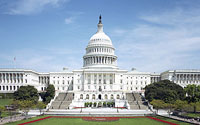Two opposing lobbies behind proposed US Congress bill – senior Russian MP

(Interfax – Moscow, 14 November) Head of the State Duma Committee for International Affairs Aleksey Pushkov is convinced that the US Congressmen’s intention to pass the so-called Magnitskiy list law’ on Friday (16 November) and to abolish the Jackson-Vanik amendment at the same time shows that two different lobbying groups, one political and one economic, are involved.
“By now, one can see in what form the House of Representatives of the US Congress will pass the so-called ‘Magnitskiy law’. Unless something changes, this law and the decision to abolish the Jackson-Vanik amendment will be passed as a single document. So, while abolishing one anti-Russian law (on the amendment – Interfax), the US Congress immediately passes another,” Pushkov said in an interview to Interfax.
According to him, this single law reflects the pressure of two powerful lobbying groups, one of which is big business, keen to use in full the opportunities that have opened for US concerns in Russia following its accession to WTO (World Trade Organization). He noted that keeping the amendment would “directly harm the position of US companies on Russian markets, putting them at a disadvantage against businessmen from other states”.
The other group of lobbyists, in Pushkov’s view, exerts political pressure on congressmen. “This political lobby includes many prominent US senators and congressmen known above all for their anti-Russian sentiments, such as, for example, Senator (John) McCain,” Pushkov said. This lobbying group insists that the US Congress should create a new lever to put pressure on Russia, using the theme of human rights observance, he said.
“As far as one can see, while President Barack Obama’s administration did not initiate these efforts or actively support them, at the same time it did not deem it necessary to strongly oppose them. This explains the emergence of the single bill, which has a positive side in terms of trade and economic relations, but is unquestionably negative in terms of political relations,” Pushkov stressed.
He noted that the balance between these two different vectors would depend above all on the new administration of the US president. “It will to a large extent depend on the political choice to be made in the area of relations with Russia by the new administration of President Obama following his re-election for the second term,” Pushkov said.
He has no doubt that “the Magnitskiy law”, if adopted, will inevitably bring extra difficulties and an element of conflict into bilateral relations between Russia and the USA.
“Our country will undoubtedly react to the anti-Russian component of this law and take countermeasures. It will be known shortly in what form,” the head of the State Duma’s international committee said in conclusion.
